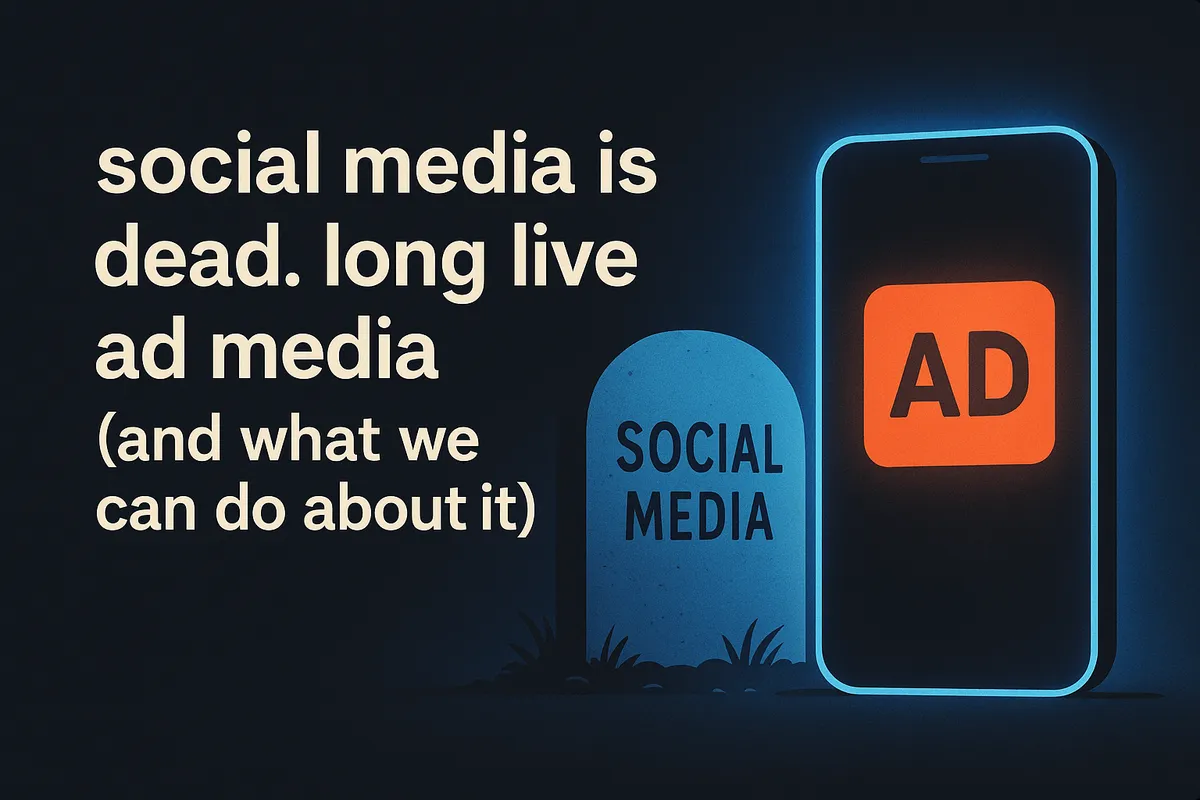social media is dead. long live ad media (and what we can do about it)

Mark Zuckerberg recently testified that 7 per cent of Instagram's content, displayed to its users, was from their friends. According to my math, 93% of the content people see on Instagram must be from celebrities, content creators and influencers. People in these categories are effectively advertising on legs with arms and a head. They make their living directly through selling something to the viewer. This can be direct via products/services/sponsorships or indirect by instilling feelings such as jealousy and FOMO, thus generating more engagement and more ad views on their content. It is not "social media" as much anymore as it is "ad media".
The Rise of Ad Media
Ads can be acceptable (in moderation) and occasionally necessary. There are some products that improve the quality of people's lives and how else would people discover them without somebody telling them first? However, advertising being blasted straight into your psyche from an infinite glowing blue light rectangle-shaped void is a completely new phenomenon and one that we should not take lightly. Advertising used to be limited to newspaper ads, billboards and the occasional jingle-filled ad break during your weekly TV show. Furthermore, it was boringly generic compared to the personalisation tech of today. Today it encompasses everything you do, and everywhere you go, and it's coming for you (and only you via hyper specific ad targeting) whether you like it or not.
My Personal Advertisement Avoidance Scheme
What is to be done? If you don't do anything and accept it, you will see 1000s of ads per day. Personally, I take the approach of blocking as much as possible on a daily basis; when blocking isn't possible, I try to avoid them as much as possible through other means. Believe it or not, it's possible to see nearly zero ads on a daily basis with a combination of using social media less, ad blockers + sponsor blockers and premium subscriptions.
I will walk through what setup I personally use to avoid both ads and trackers. Trackers are also important to block to give adtech companies as little information about you as possible, making advertising harder to personalise. I personally do not like the idea of my data being sold, though I understand practically it does not affect my life too much on a daily basis; this is mostly out of principle.
Browser
In my opinion, this is the most effective place to start. I use Brave Browser with uBlock Origin1 (I know it's not necessary, but I just don't want an ad/tracker to get through). The most ads I would see is from daily browsing on my laptop/desktop machines; I am happy to say I have not seen an ad in many years and I intend to keep it that way.
Search
I do not use Google Search and I haven't for a while; you're gonna have to accept the fact that free search is just advertising tech with a search feature. To get around this, I pay for search, I recommend Kagi or Brave Search Premium; both are great options. Brave is more affordable and minimal whilst Kagi offers a lot more bell-and-whistles upfront (including their own AI and lots of cool advanced search features). I used Kagi for a long time, but recently found Brave Search to be a better price for the features I actually need (basic and straightforward good search).
Social Media
I quit Facebook almost 10 years ago, I don't use Instagram, I only go on X and there I pay for premium to see very few promoted posts.
DNS Blocking
I use NextDNS on all my devices for maximum tracker/ad blocking and some privacy improvements. NextDNS is excellent and they have a super generous free tier, and an easy setup process for a very wide range of devices (even Apple TVs!).
YouTube
I pay for YouTube premium. When I'm travelling, I sometimes use vanilla YouTube on hotel TVs. The amount of advertising is insane, I can't believe that most people live like this. I also use SponsorBlock for skipping sponsor sections.
Ecosystems & Firewalls
I use Apple devices (still somewhat preferable over Google devices, but not as free from tracking as Linux/GrapheneOS). For my main laptop, I also use Little Snitch to block all Apple communication (as I don't use iCloud after the recent Advanced Data Protection turnoff in the UK). I will write about this in the future, but effectively my laptop pings as little information as possible to Apple or any other product developer/service.
Open Source Software
I stick to using as much open source software as I can; I mostly use homebrew as I'm not logged into an Apple ID so I can't use the App Store. This sounds more annoying than it actually is in practice.
Isn't this annoying as hell to maintain?
You can't get rid of all trackers/ads, but I'm personally happy with my setup. It sounds like a lot and maybe it is for most people; but it's not hard to set up, effectively requires zero maintenance beyond the initial installation. The most annoying to set up is Little Snitch but even that can be made easier with configuration files.
Pls help - where to start?
If you want to get started, and this all seems intimidating to you; don't worry, I added all these things slowly. The best place to start would be to install Brave Browser and use that as your main browser; doing that alone will go a long way to removing advertising and trackers from your life.
you can do this even after the recent Chrome changes by enabling v2 manifest in the Brave Browser settings.↩